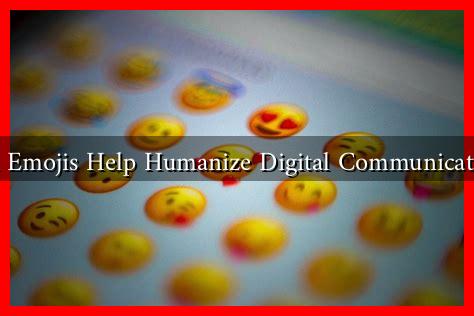-
Table of Contents
Can Emojis Help Humanize Digital Communication?
In an increasingly digital world, the way we communicate has evolved dramatically. Text messages, emails, and social media posts often lack the emotional nuance present in face-to-face interactions. Enter emojis: small digital images or icons used to express ideas, emotions, or concepts. But can these tiny symbols truly help humanize our digital communication? This article explores the role of emojis in enhancing emotional expression, bridging cultural gaps, and improving overall communication effectiveness.
The Emotional Impact of Emojis
Emojis serve as a visual language that can convey emotions and sentiments that words alone may fail to express. Research indicates that the use of emojis can significantly enhance the emotional tone of a message. A study published in the journal *Computers in Human Behavior* found that messages accompanied by emojis were perceived as more friendly and approachable compared to those without.
- Enhancing Clarity: Emojis can clarify the intent behind a message. For instance, a simple “I’m sorry” can be interpreted in various ways, but adding a sad face emoji can convey genuine remorse.
- Reducing Misinterpretation: In text-based communication, tone can be easily misread. Emojis help mitigate this risk by providing visual cues that indicate the sender’s emotional state.
Bridging Cultural Gaps
Emojis are not just a Western phenomenon; they have become a global language. According to a report by the Unicode Consortium, over 3,000 emojis are now available, and their usage transcends linguistic barriers. This universality can help bridge cultural gaps in communication.
- Common Ground: Emojis can create a sense of shared understanding among people from different backgrounds. For example, the heart emoji is universally recognized as a symbol of love and affection.
- Adapting to Local Contexts: Different cultures may interpret emojis differently. For instance, the thumbs-up emoji is a positive gesture in many cultures but can be considered offensive in others, such as in parts of the Middle East. Understanding these nuances is crucial for effective communication.
Case Studies: Emojis in Business Communication
Businesses have also recognized the potential of emojis to humanize their communication. A case study by the marketing firm *Emojipedia* revealed that brands using emojis in their social media posts saw a 25% increase in engagement rates. Here are some notable examples:
- Domino’s Pizza: The brand launched a campaign allowing customers to order pizza by simply sending a pizza emoji. This innovative approach not only simplified the ordering process but also created a fun and engaging customer experience.
- Slack: The workplace communication tool incorporates emojis to foster a more relaxed and friendly atmosphere among team members. Users can react to messages with emojis, making interactions feel more personal and less formal.
Statistics on Emoji Usage
The popularity of emojis is evident in their widespread usage. According to a survey conducted by Adobe, 61% of people prefer to communicate with emojis rather than words. Furthermore, 70% of respondents believe that emojis help convey emotions better than text alone. These statistics highlight the growing acceptance and reliance on emojis in everyday communication.
Conclusion: The Future of Emojis in Communication
As digital communication continues to evolve, emojis are likely to play an increasingly significant role in humanizing our interactions. They enhance emotional expression, bridge cultural divides, and improve clarity in communication. While it is essential to be mindful of cultural differences and the context in which emojis are used, their potential to enrich our digital conversations is undeniable.
In summary, emojis are more than just playful symbols; they are powerful tools that can enhance our ability to connect with others in a digital landscape. As we navigate this ever-changing communication environment, embracing emojis may be one of the keys to fostering more meaningful and humanized interactions.
For further reading on the impact of emojis in communication, you can visit Emojipedia.

